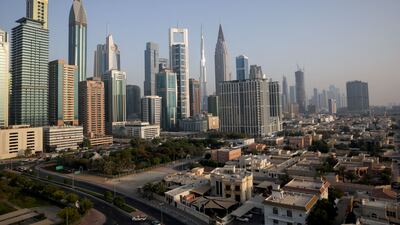Business activity in Dubai’s non-oil private sector economy continued to improve in July, recording the fastest output growth in three years amid a sharp increase in new orders.
The emirate's headline, seasonally adjusted S&P Global purchasing managers’ index rose to 56.4 in July, from 56.1 in June, its best performance since June 2019.
A reading above the neutral 50 level indicates economic expansion while one below points to a contraction.
“Dubai’s non-oil private sector registered the fastest rise in output in three years in July, supported by another solid increase in new business and promotional activity,” said David Owen, an economist at S&P Global Market Intelligence.
Dubai’s economy, which made a strong rebound the coronavirus-induced slowdown last year, has carried the growth momentum into this year, supported by the resurgent travel and tourism sector and its rapidly improving property market.
The emirate’s economy grew 6.2 per cent in 2021, according to preliminary data from the Dubai Statistics Centre. In the first three months of this year, Dubai’s gross domestic product expanded 5.9 per cent, according to government data.
The UAE’s property sector continues to recover from the impact of the coronavirus pandemic on the back of government initiatives such as residency permits for retirees and remote workers, as well as the expansion of the 10-year golden visa programme and the economic boost generated by Expo 2020 Dubai.
The value of property deals in Dubai more than doubled last year to break a 12-year record in terms of sales transactions, buoyed by demand in the secondary real estate market, according to listings portal Property Finder.
Although the volume of new business eased from June’s near-three year high, it was still sharp overall, the S&P Global report said.
Marketing activity, including promotions and discounting by businesses, drove up sales last month.
Output last month rose for the 20th month in a row. Companies reported a marked rise in tourism-related business activity in Dubai, the Middle East’s commercial and tourism centre, as travel restrictions continued to ease around the world.
Dubai hosted 7.12 million international visitors in the first half of 2022, about three times the 2.52 million tourists recorded in the same period last year, the emirate’s Department of Economy and Tourism (DET) said on Monday.
The number brings the emirate closer to its pre-Covid-19 pandemic levels of 8.36 million arrivals in the first six months of 2019, the DET said.
Dubai’s labour market also continued to improve in July, with employment rising for the third successive month.
The travel and tourism sector recorded the sharpest increase in employment in July, the report said.
Inflation has been rising in the UAE, in line with the global trend. The consumer price index increased by 3.4 per cent during the first quarter of 2022, compared with 0.6 per cent and 2.3 per cent in the third and fourth quarters of 2021, respectively, according to the UAE Central Bank.
Inflation is projected to reach 5.6 per cent in 2022, the Central Bank said.
There was an easing of cost inflationary pressures for Dubai’s non-oil private sector after June had registered the fastest rise in input prices since January 2018, the S&P Global report said.
Although input cost inflation broke a four-month sequence of accelerating price increases, cost pressures were at their second highest in four and a half years.
“Input price inflation remained among the fastest on record, despite slowing from June’s 53-month high. Fuel prices again impacted firms’ costs, notably in the travel and tourism sector where input prices rose the most since this index began in 2015,” Mr Owen said.
The travel and tourism sector recorded the fastest rate of input price inflation, according to the report.
“There was also evidence of rising pressure on firms’ selling prices,” Mr Owen said.
“Although overall charges levied for goods and services were broadly unchanged since June, this ended a 12-month sequence of discounting.”
With new order growth picking up pace, businesses said they were confident about output growth over the coming year.


